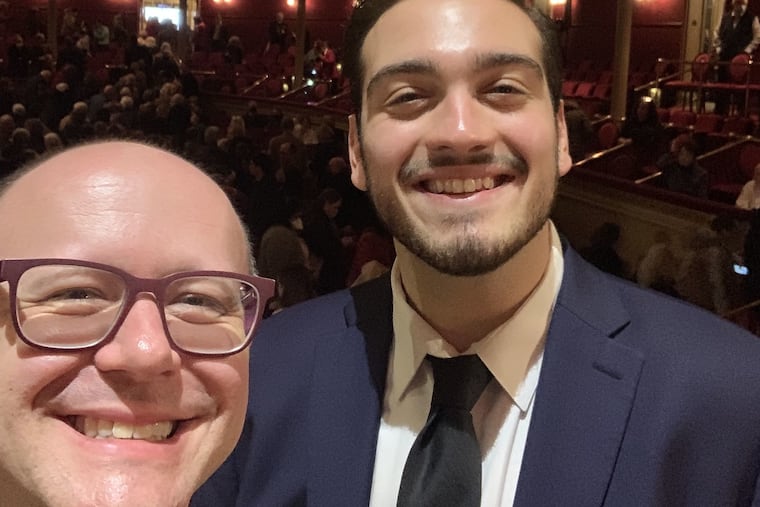When an Opera Philadelphia tenor fell ill, a Curtis student brought the high notes
Joseph Tancredi had only about an hour to learn one of classical music's toughest solos.

When it comes to cliffhangers in the operatic realm, the storyline backstage is sometimes as good as the one onstage.
The scene: Center City on Sunday, an hour and a half before curtain time at the Academy of Music. The premise: the singer is too sick to go on.
Replacing ailing vocalists is hard under any circumstances, but this wasn’t just any vocal part. It was the tenor solo in Orff’s Carmina Burana — notoriously high, slippery and exposed.
“You not only have a high C but have a high D, and you have to sing it three times, and so it’s just a very select group of people who can sing it,” says Grant Loehnig, head of the music staff at Opera Philadelphia.
It was Loehnig who, at 12:30 p.m. Sunday, found himself searching for a new tenor for the opera company’s production of Carmina Burana after texts started flying about the ill tenor.
He thought of one: Joseph Tancredi, a 25-year-old Curtis Institute of Music student he had met while rehearsing other pieces at the school, where Loehnig is an opera coach.
“I knew Joe had the notes, I knew that he had a large voice that could fill the Academy of Music and had the right kind of temperament to step in at the last minute. But I didn’t know if he knew the tenor solo,” said Loehnig.
So he texted Tancredi and asked. The tenor had never sung it.
Loehnig started thinking of other possibilities. But the clock was ticking, and it occurred to him that the solo was a short one. Could Tancredi learn it in time?
It was 1 o’clock — an hour before curtain.
The alternative was to cut the entire section from the piece, a prospect that would have diminished the work and robbed it of one of its most recognizable — and strangest — passages: the first-person account of a swan once beautiful now being turned and roasted on a spit.
“I called him and asked if I was crazy, and he said he was at Chestnut and 23rd, and I said why don’t you listen to it on YouTube and I will scan the two pages of music when I get to the office?”
Tancredi, a fourth-year Curtis student from Bayville, N.Y., said he was shocked to get the call, but “felt like if Grant had that confidence in me and I had the trust I could do it well, that’s all I needed.”
He grabbed his suit and headed over to the Academy of Music. “It was 1:30 when we were able to go through the music for the first time together, and I instantly knew he was going to be able to do this,” Loehnig said.
At 1:45 — 15 minutes before curtain — the two went into the dressing room of conductor Lina González-Granados for her blessing. “She was so supportive,” said Tancredi, “and she said, ‘As long as you feel comfortable doing it, let’s do it.’”
Opera Philadelphia general director David Devan came out at the beginning of the concert, which opened with Margaret Bond’s Credo, and announced that for Carmina Burana, Alasdair Kent was sick, Tancredi would be stepping in, and then asked that the audience give the tenor a “big Opera Philadelphia embrace of support.”
They did. Tancredi sang. And “he was amazing,” said Loehnig. “There are only a handful of tenors who can make it through that solo. I just looked around and the smiles on the faces of the orchestra and chorus members, everyone was so happy for him.”
It was both an Opera Philadelphia and Academy of Music debut for the singer.
“It was a pretty surreal moment,” said Tancredi. “I just felt a lot of relief on my end, definitely.”
Looking back, he’s considered the possibility that if he’d had a month to prepare, the tough part might have freaked him out more than it did.
“I didn’t think something like that would happen on a Sunday afternoon when I was in the middle of doing laundry,” he said. “It’s absolutely something I’ll never forget.”